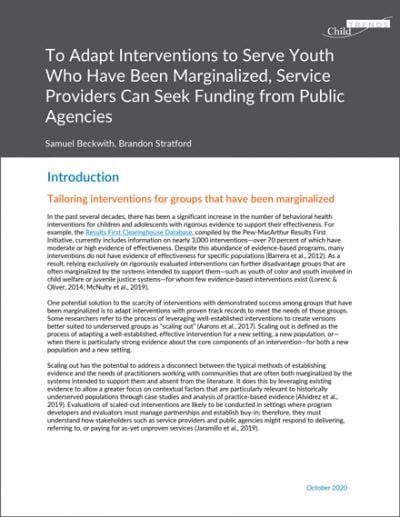Baseline Buy-in
Public officials and service providers were willing to refer youth to the adapted intervention for services — despite limited evidence of its effectiveness — because of the rigorous evidence behind the original intervention.

This brief presents research — funded by the Annie E. Casey Foundation — on the experiences of two neighboring jurisdictions that worked to implement an intervention called Multisystemic Therapy for Emerging Adults (MST-EA).
The intervention, adapted from a rigorously tested evidence-based approach called Multisystemic Therapy, aims to bridge a gap in behavioral health services for youth and adults.
The document explores how service providers and public agencies might respond if asked to invest in an untested adaptation of an intervention, such as MST-EA. It also identifies lessons and hurdles that the two jurisdictions encountered while trying to implement MST-EA.
The research indicates that, given the right circumstances, public officials are open to paying for services as part of evaluations of adapted interventions. This is particularly true when such services are helping to meet the needs of underserved and marginalized populations.
There are two basic types of behavioral health and judicial systems: Those that serve children and adolescents and those that serve adults. As a result, youth enrolled in systems of care who are transitioning into adulthood — sometimes referred to as emerging adults — represent a particularly vulnerable group.
Emerging adults are likely to have developmental needs that are not well-addressed by either type of system. Equally concerning: Relying exclusively on rigorously evaluated interventions can further disadvantage marginalized youth — such as young people of color and system-involved youth, for whom few evidence-based interventions exist.
One potential solution? Take interventions with proven track records and adapt them to meet the specific needs of marginalized youth.
We hope you'll find value in this report. We’d love to get a little information from you, which we'll use to notify you about relevant new resources.